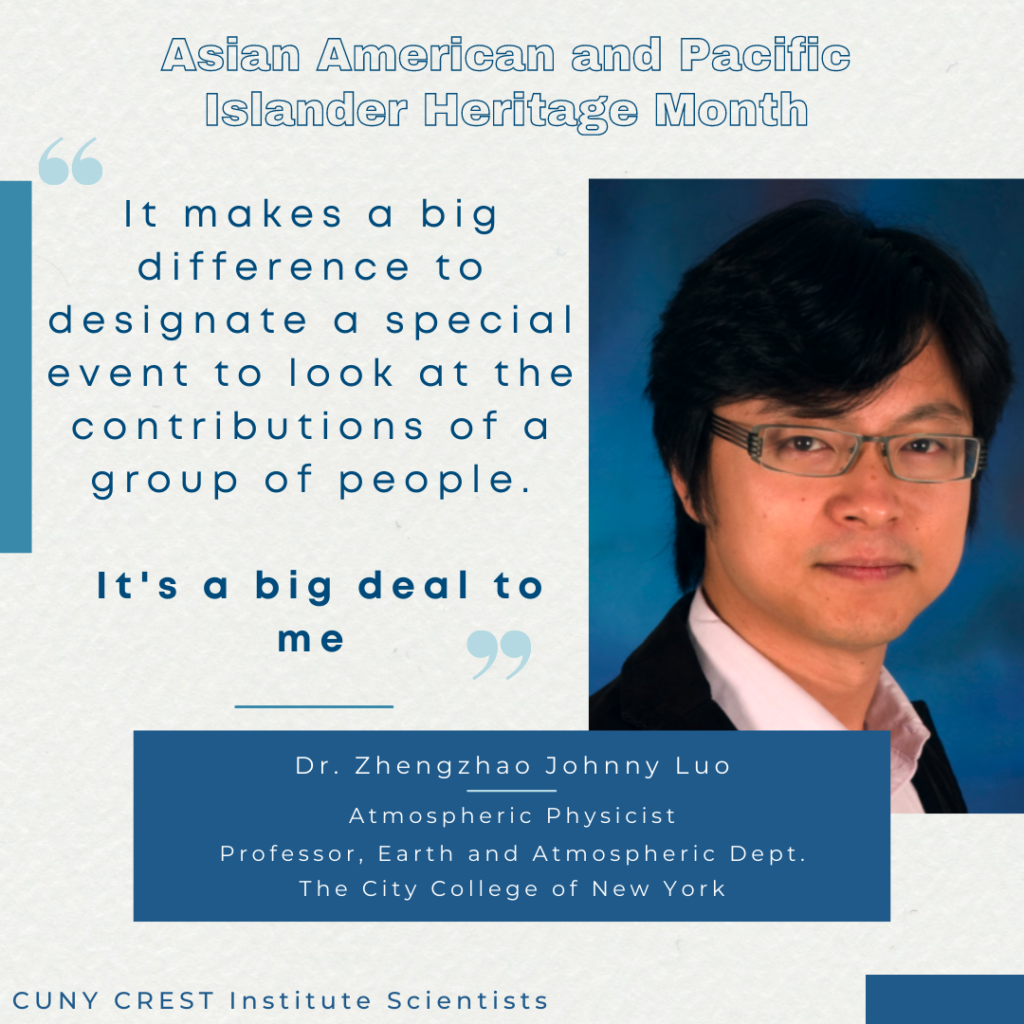AAPI Heritage Month: Dr. Zhengzhao Johnny Luo
Interviewing Dr. Zhengzhao Johnny Luo
Dr. Johnny Luo is an Atmospheric Physicist and a Professor from the Earth and Atmospheric Department at the CUNY City College of New York. His research interests revolve around using remote sensing and in situ measurements to understand the roles of clouds and storms in climate and air quality, which help improve numerical models that can make predictions of the future climate change.
How did you find a passion in the Earth Systems Sciences?
I was fascinated in physics ever since middle school. My middle school and high school classes made me want to study physics. When I chose a major in college, I selected applied physics field, namely, Atmospheric Physics. Later, I went to graduate school and became an Atmospheric Scientist in early 2000s. At that time, climate change started to become a hot topic. I thought to myself “perhaps I can apply my passion to studying the physics of climate to make an impact on people’s lives.”
What obstacles have you faced in your profession as an Asian American/Pacific Islander in the Earth System Sciences? How did you overcome them?
Culturally, Asians are generally shy and low key. It is treated as a virtue as you grew up. Never overemphasize. Stay humble. That is kind of a cultural thing. In the American society, however, if we find something interesting, we speak up and let people know, so that people will pay attention. The cultural shock was one of the obstacles that I faced, when I first came to this country. But I found inspirations from the diverse environment in the City College of NY. One can see colleagues from different backgrounds, expressing themselves freely. When they do so, they are often well received. The CCNY environments had a very positive influence on me.
What does AAPI Heritage Month mean to you?
May is the Asian American Pacific Islander Heritage Month. It’s a good thing to have this heritage month because it brings awareness of the contributions made by these people. By celebrating AAPI heritage month, we know more about this group, and recognize as an important minority in this country. It makes a big difference to designate a special event to look at the contributions of a group of people. It’s a big deal to me.
What has been your biggest motivation?
My biggest motivation here is that not only do we work on important science questions of our field, but also work with students to contribute to the field. It’s a strong motivation, as well as a strong encouragement to see students grow. Sometimes when students come to a lab, you can see they are motivated, but they don’t know much. Then, we mentor them to get their feet wet, and gradually they grow. Eventually they will make contribution to the field, under the supervision of their mentors. That is the biggest inspiration, encouragement and motivation for me to continue. Every time you see a student graduate, or publish a paper, you feel such a comfort as a professor. It’s the best reward ever to a professor to see the students grow up intellectually.
What advice would you give young students who are interested in the Earth Systems Sciences?
We advise the students that in order to maximize your opportunity and your experience at City College, be proactive. Seek opportunities and reach out to professors as much as you could. Education at City College is not just about taking classes. Getting straight A’s is just one measure of success in college environments. It is also important to get some research experience in a professor’s lab. Just reach out as early as possible to various professors. Talk to them to find out if their research and your own interest are aligned. Various resources are available to support undergraduate and graduate research. You would be able to earn a stipend and most importantly, earn valuable research experience in a professional setting. Once again, this is an advice I want to give to students: reach out to professors and have a more complete academic experience while you are pursing your academic degree in the college.

